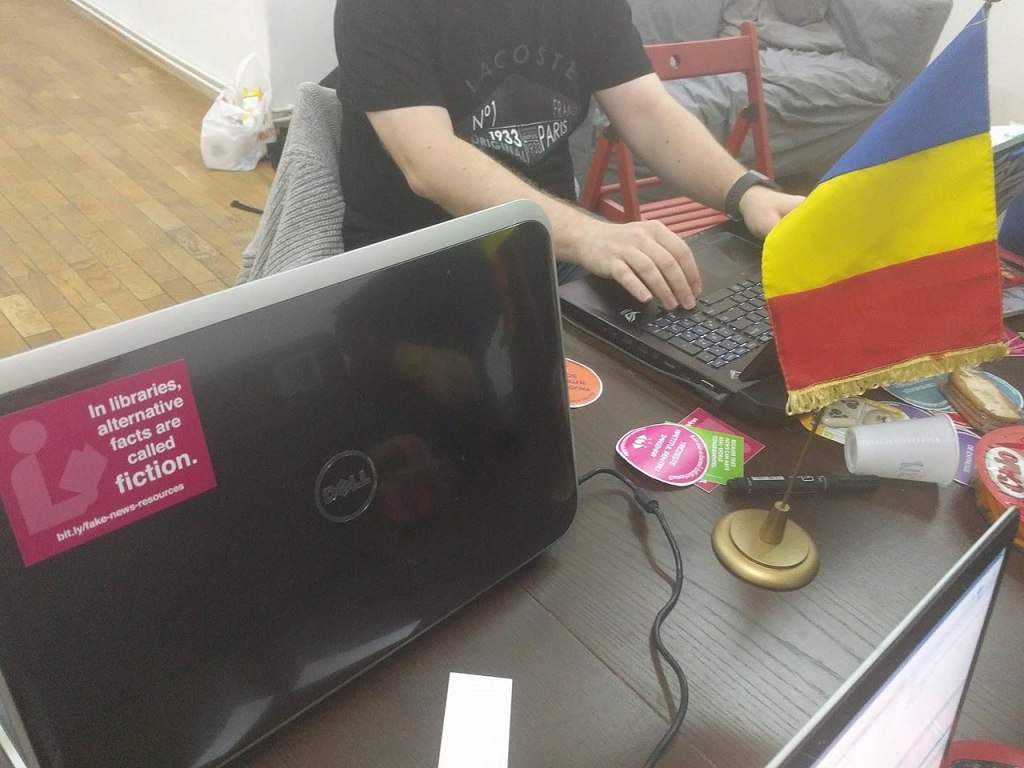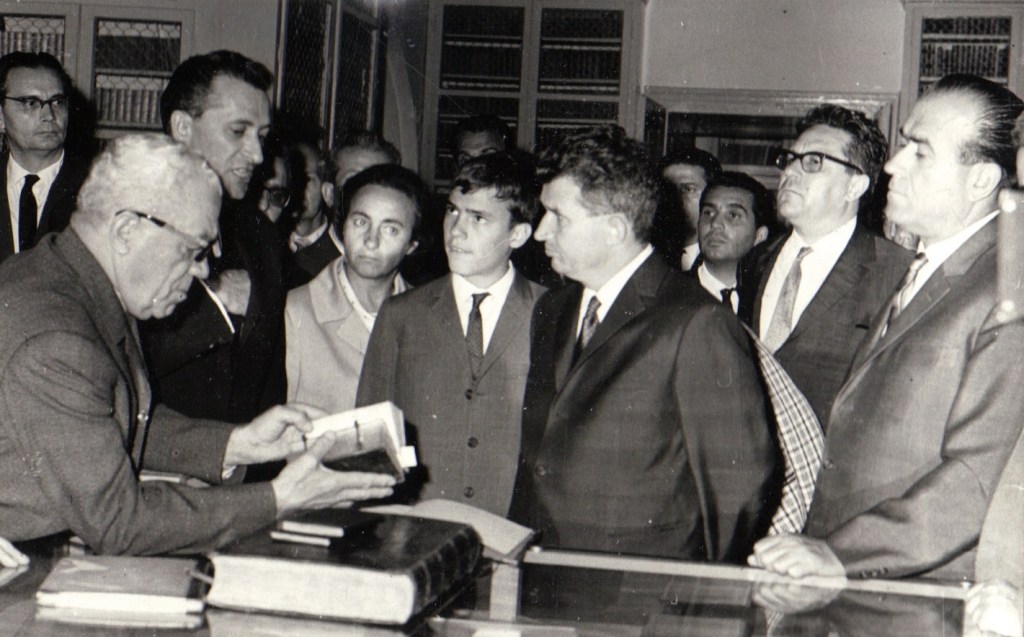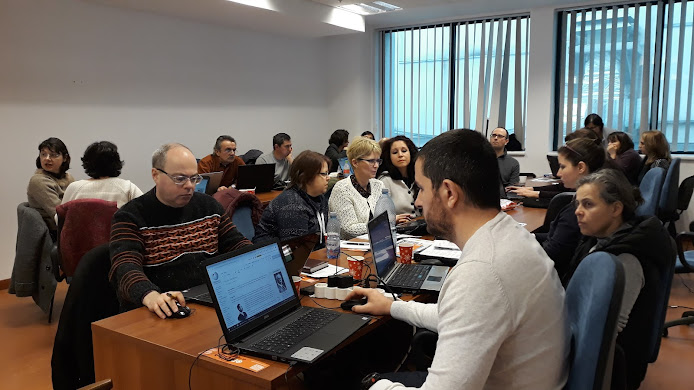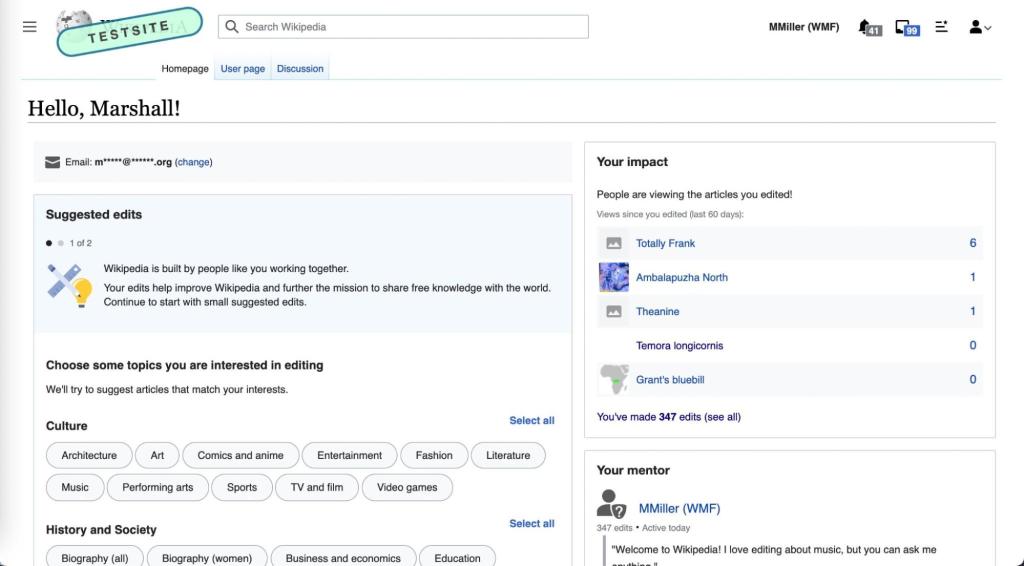
It’s that time of year when Wikimedians and librarians across the world meet, collaborate, and celebrate shared values through #1Lib1Ref (“One Librarian, One Reference”). This twice-annual campaign invites librarians, archivists, and other information professionals to help strengthen Wikipedia (and Wikidata, or Wikisource) by adding references to reliable sources anywhere that such citations are missing. Librarians, like Wikimedians, are all about finding, vetting, and organizing information, and so they are natural allies in maintaining the sprawling bibliography of the sum of all knowledge.
But the broad universal themes of #1Lib1Ref can also obscure the wide variety of circumstances in which libraries, and Wikimedia communities, find themselves. It’s easy, in the abstract, to see why Wikimedia and libraries are a good match, but how the bridge gets built in practice often takes a lot of experimentation and adaptation to local conditions. So it is always illuminating to take a closer look at a specific regional context and see how things have worked (or not worked) there.
In the course of preparing for the 2022 campaign, I had the great pleasure of speaking with Claudia Șerbănuță and User:Strainu. For about five years, they have been at the heart of the Wikimedia movement’s efforts in Romania and Moldova (close neighbors with a common language) to recruit and train librarians. I first learned of their efforts from a presentation they gave at Wikimania 2021 in August (and a similar talk delivered at the CEE online gathering in November). Șerbănuță is herself a librarian, holds a PhD in Library and Information Science, and was named a Library Journal “Mover and Shaker” in 2021. She was interim general manager of the Romanian National Library from 2014-16 and currently is Public Libraries Specialist at the Progress Foundation, a Bucharest-based NGO focused on education and community development. Strainu is a longtime Wikipedian and Wiki Loves Monuments organizer, and one of the founding members of the Wikimedians of Romania and Moldova User Group. The user group was among the earlier adopters of the #1Lib1Ref playbook and have been iterating on it since 2017.
There were two things I found particularly fascinating in chatting with Claudia and Strainu. First was learning more about the situation of libraries in a post-communist society like Romania. Libraries, like any other type of institution, are reflections of their surrounding culture and political system. In countries of the Soviet bloc, this meant libraries were instruments of censorship and information control. Claudia actually wrote her dissertation on public library services in 1970s and 1980s communist Romania (you can also read an article-length distillation of her research). Through archival research and 28 oral history interviews with librarians who worked during the late-communist period, Claudia painted a portrait of a profession that almost completely inverts the idea most of us hold of libraries as champions of information access. “Censorship was practiced continuously,” Claudia told me.
“Information was never to be really free. That led to an internalized censorship. Even to this day, when people become librarians, they inherit a bit of self-censorship and fear to really put information out there from past generations who did this out of the need to survive and exist.”

In their Wikimania talk, Claudia and Strainu referred to these generations of Romanian librarians as “silenced voices”. Claudia describes the lengths one would need to go to to retrieve up-to-date research materials, say, the latest computer science journals:
“If the librarian trusted you, and you looked like somebody who was really serious and would not turn them into the police, the librarian might suggest that you should go to Bucharest to the US Embassy library, where they could really help you find the most updated information on the topic you were interested in, because they would have access to the free world information. But the trust was supposed to be there. So even if the librarian would know that information, he or she would not share it with you freely.”
I was interested to learn more about how this historical legacy affected current efforts to engage librarians and bring them into the Wikimedia community. Claudia explained that, even three decades after the fall of the communism, the old ways hang heavy — a situation not helped by digital literacy gaps, a lack of modern library training programs, and a strong reliance on direct librarian-to-librarian mentorship that reinforces old mindsets and practices:
“I’m sorry to say that, to this day, I still see similar behavior with some libraries in our country. Within public librarianship there was a shift in professional values, and this shift was never unshifted. Nobody really tried to turn things back to normal in a systematic way. So really professional librarianship is out there looking for an identity. Coming now with open access values… there is an institutional structure that does not encourage access. Open access is an idea, something very vague in our culture to this day. ‘How bout trying that?’ you say. ‘Why? It’s not in my job description. Somebody should do it, let somebody do it.’ — And that somebody is never me.”
These don’t exactly sound like ripe conditions for wiki-engagement. Indeed, the other eye-opening part of these conversations was learning about how Claudia and Strainu have persevered — about the different approaches they took year to year, always experimenting and applying lessons learned in the next iteration (evoking Movement Strategy recommendation #10: Evaluate, Iterate, Adapt). Strainu described their first attempts with #1Lib1Ref in 2017 and 2018, which attracted only a handful of participants:
“We followed the international recipe to the comma. We held Saturday events in small branches of the city libraries in Bucharest and Chișinău [Moldova’s capital] and participation was… a bit disappointing.”
There was one very positive outcome, however. Claudia was among that first cohort of librarians to try their hand at editing. From that moment, she became convinced of the potential of Wikimedia to help revitalize the library profession in Romania. And so, a Wikimedia organizer was born. Claudia:
“I strongly believe that working with the Wikimedia community will help librarians find their way in how they can best help their communities.”
In 2019, Claudia and Strainu formally teamed up and tried a different approach: they “dropped the ref” part of the recipe, and organized a single-day event with the National Library focused on article writing on participant-selected topics. This was held on a weekday and was promoted as a professional development event. More than 50 librarians showed up.

Two years later, Strainu is disappointed that none of them stuck around (only one of these participants still very occasionally edits). But for Claudia, bigger possibilities began to come into focus. Adding to her inspiration was Antje Theise, a guest speaker from Hamburg University Library, flown in by the Library of Goethe-Institut Bucharest (supporters of the event). Hearing about the inroads she had made in German libraries set Claudia’s imagination racing with ideas. A quick one was to visit libraries that, while at the National Library, expressed their interest to learn more about editing Wikipedia. That year, Wikimedians of Romania and Moldova offered additional one-day training at two county libraries outside Bucharest: Argeș and Galați.
Then the pandemic hit. In an encouraging sign, the County Library in Braşov, a small city in the middle of the country, proactively reached out to the user group and requested Wikipedia training for librarians during lockdown. Excited by this sign of spontaneous demand, Strainu designed an 8-week online course which onboarded the librarians into the Wikipedia process and then walked them through writing an article “from the bottom up.” The course saw strong engagement from a number of participants, and led to the creation of several quality articles (several of the trainees still edit). There were still numerous challenges, however. Interestingly, I learned that Romanian librarians often have trouble grasping core editorial policies like Neutral Point of View (Claudia has even submitted a proposal to the Wikimedia Research Fund to further investigate this). Strainu recalled participants finding Wikipedia’s neutral style to be “constraining.” He mused that his students used a lot of “weasel words” — unsupported attributions that are a big no-no in Wikipedia’s Manual of Style. He also had the interesting reflection that these tendencies seem linked to the repressive professional context that Claudia had documented in her research. “It’s another way of not taking responsibility, of not being sharp in what you say.”
But they also found new angles of engagement in Braşov, which was plugged into a network of local (many rural) libraries. There are strong traditions in Romanian regional libraries of documenting local history, and Claudia and Strainu found a number of highly motivated contributors with deep knowledge and unique local history collections that have enriched Romanian Wikipedia’s coverage.
Following the success of the “pandemic edition” of their program, Claudia has been exploring another approach, delivering Wikipedia training through a learning circles methodology offered through the Progress Foundation (in collaboration with Goethe-Institute Bucharest and the Peer 2 Peer University). In 2021, she trained two enthusiastic cohorts of librarians and other professionals from memory institutions. The learning circles — facilitated peer groups who develop skills through a socially engaged process — serve as a sort of “training of trainers” program. Claudia’s vision is for the trainees to start their own learning circles and to spread wiki-knowledge throughout the Romanian library ecosystem. Most recently, librarians in this burgeoning network have been invited to participate in the Wiki Loves Romania photo drive and contest, and three #1Lib1Ref events are in the works with three different Romanian library partners as part of this year’s campaign cycle.
I was also very pleasantly surprised to discover that the learning circles have been strongly influenced by great product work happening at the Foundation. Claudia and Strainu specifically cite the Personalized First Day philosophy developed by the Growth team. This is best understood as an intervention into the moment after a user first creates a Wikipedia account. It treats this moment as an opportunity to learn more about what the user is hoping to accomplish so that they can have a first editing experience relevant to them. In the learning circles, new Romanian account holders are encouraged to use the “suggested edits” feature, which allows newcomers to choose topics of interest (like History, Physics, or Fashion), and then to see a feed of suggested edits related to those topics. As they continue to pursue the concept of a personalized first day, the Growth team is building “structured tasks”, which use algorithms to guide newcomers through completing simple, but valuable, edits. Where this goes from there is an exciting prospect to imagine.

Ever since I first saw the suggested edits, I have been dreaming about how this guided newcomer journey could be woven into off-wiki outreach and editing events. At last, here is a viable introductory experience for Wikipedia that is built into the platform. This could give organizers of editathons a big advantage in actually being able to give newcomers achievable tasks, and to ensure that newbies leave feeling successful, and curious about going deeper. The Romanian learning circles have adopted much of the newcomer experience being developed by the Growth team. Seeing these organizer iterations out in the field finding their way organically to the iterations of a Foundation Product team felt like the beginnings of some good magic. One of my next steps after publishing this post will be to arrange a call with Claudia, Strainu, and the Growth team so we can leverage their learnings out in the field to improve the features for the newcomers around the world encountering them every day.
But product innovation will only get us part of the way toward creating a welcoming Wikimedia environment. As Romania’s librarians begin to step out of their comfort zone and change, so must Wikimedia communities. Strainu described his process of “marking the territory” around his trainees to prevent them getting harangued by experienced editors, or getting their contributions swiftly deleted. Claudia admitted to being happily ignorant of most of these behind-the-scenes maneuvers. But at numerous points during our conversation, she expressed gratitude for Strainu’s protection and described the comfort of knowing he had her back. Strainu says without hesitation that the extra effort is worth it.
“As we all know, Wikipedia can be a scary and aggressive — and very male — space at times. Actually adapting the space for new contributions and new ways of thinking requires changes to your community’s practice. It’s not easy, but it’s worth it, because the level of insight and the level of content they can bring is significant. It also diversifies the breadth of content that’s available on your Wikipedia, because some of the stuff that librarians write about can be not well covered.”
It’s a curious irony in this story that, in trying to help librarians overcome their self-censoring tendencies to try a more open approach, Claudia is leading them into a sometimes hostile environment on Wikipedia that can, unfortunately, end up reinforcing the self-censoring instinct. Claudia:
“Most of the librarians in Romania are women, and we are a very misogynistic society. So if you are a woman editing on Wikipedia and a guy tells you this is garbage, you are hurt so many more times than you should be… We had very good librarians saying ‘no way, I’m not going back there.’”
In this sense, Claudia faces a double-edged challenge: she is working simultaneously to heal the traumas suffered and inherited by Romanian librarians, but also to shift the Wikimedia culture in a more inclusive direction. I was struck by the fact that, though an active member of the Wikimedia community for nearly five years, Claudia is still hesitant to visibly lead or propose ideas directly to the core community, leaving much of that engagement to Strainu. She is glad to know that Strainu is always nearby and ready to intervene and defend. This demonstrates the importance of mentorship in the movement, and underscores the need to better recognize and support the efforts of welcomers and allies like Strainu. But it also says something that, even while becoming an active and successful movement organizer, it can still take years to develop the confidence to dive in deep on the wikis — to develop a sense of safety and belonging in the place where knowledge production actually happens. Claudia mentioned she intends to spend more time studying the new Wikimedia Universal Code of Conduct — “to know her rights”, you could say — as a way of building up the courage to edit more.
To offer a space of healing for professional traumas like the ones Claudia has chronicled in Romania, we as a movement must first address our own internal pathologies and figure out how to truly open the door to those who (might) wish to join us. Our hope is that #1Lib1Ref is one of those door-opening initiatives. After all, it’s the reason I got to have this wonderful conversation with Claudia and Strainu. I can think of many other wonderful Wikimedians who found their way in via a similar door.
#1Lib1Ref continues through the 5th of February. Learn more about how you can participate at: 1Lib1Ref.org
Ben Vershbow is Director of Community Programs at the Wikimedia Foundation. You can follow him on Twitter at @subsublibrary.

Can you help us translate this article?
In order for this article to reach as many people as possible we would like your help. Can you translate this article to get the message out?
Start translation